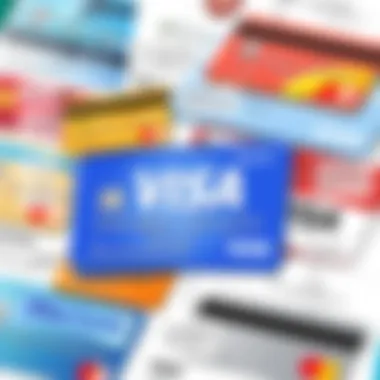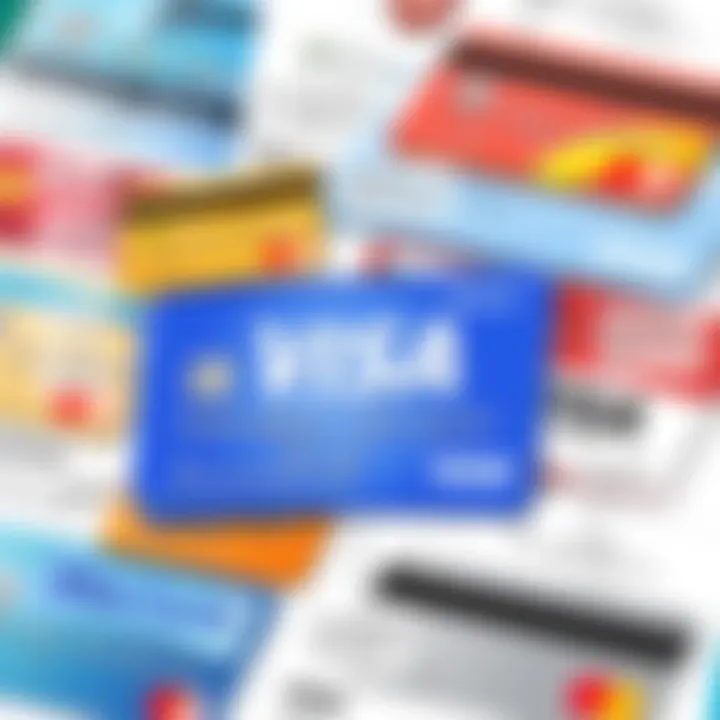Comprehensive Guide to Getting a Visa Card


Intro
Obtaining a Visa card can feel like navigating a ship through foggy waters. There’s a whole world of options and requirements that can seem daunting at first. Knowing the ropes ahead of time can make the journey smoother and more manageable. This guide isn’t just about getting a Visa card; it’s about understanding what’s involved and finding the card that suits your needs like a glove.
Visa cards come in various shapes and sizes, much like finding the right key for a lock. From credit to debit, prepaid to secured, each type of card serves a distinct purpose and has its unique eligibility criteria. Jumping into the application pool without knowing the basics can lead to missed opportunities or even frustration—much like throwing a dart blindfolded.
In this article, we’ll break down the steps needed to obtain a Visa card, highlighting key points along the way. Preparing the groundwork will help you sift through all the noise and focus on what matters—making informed financial decisions. So, whether you’re a student wanting to start building credit, a savvy investor looking to maximize rewards, or someone managing day-to-day expenses, there’s something here for you.
Equipped with the right information, you can navigate this terrain with confidence. Let’s dive into the world of Visa cards and explore what makes them tick.
Understanding Visa Cards
When entering the financial landscape, Visa cards represent a vital tool that can shape one’s experience significantly. They come in various forms, each serving distinct purposes and addressing unique needs. Understanding these cards is crucial for individuals aiming to manage their finances efficiently and make informed decisions.
Visa cards, by virtue of being widely accepted across numerous platforms and services, provide a sense of security and convenience. They simplify transactions, whether in-person or online. For many, it feels like having cash at their fingertips, without the risk of losing bills or coins.
Furthermore, with the growing digitalization of payments, the relevance of knowing how Visa cards work cannot be overstated. They often come with various benefits, such as rewards programs, purchase protections, and travel perks. However, these advantages come intertwined with responsibilities, such as managing payments and understanding fees. This article dives deep into these dynamics to clarify the realm of Visa cards, enabling users to navigate this path with confidence.
Prologue to Visa Card
A Visa card serves as an official ticket to making purchases globally. It's more than just plastic; it represents an agreement between the cardholder and a financial entity, permitting the holder to borrow funds up to a certain limit or use their own money directly. What stands out is the trust associated with the Visa brand, which has built its reputation on reliability and global acceptance.
Navigating the nuances of Visa cards involves assessing several aspects, from credit lines to fees and even security measures. Many individuals find themselves at a crossroads, unsure which type of Visa card suits their lifestyle and spending habits best. An engaging look into these components can pave the way for better financial management.
Types of Visa Cards
Visa cards come in three primary forms, each tailored to meet different financial needs:
Credit cards
Credit cards allow users to borrow money up to a pre-set limit for purchases or cash withdrawals. One defining characteristic is credit utilization—the credit amount available versus what is used. This feature is beneficial for many as it aids in building credit scores, crucial for future financial endeavors.
However, depending on the card issuer, interest rates can be steep, especially if balances aren't paid off promptly. It's a double-edged sword: if used wisely, credit cards can offer rewards and enhance the credit rating; mismanagement can lead to snowballing debt. Staying diligent with payments is the name of the game, as timely payments influence creditworthiness.
Debit cards
Debit cards are directly linked to the holder's bank account, allowing individuals to spend only what they have. This key facet promotes better budgeting since one cannot overspend without funds available. The simplicity of immediate transactions is appealing, as it eliminates debt worries and potential interest fees associated with credit cards.
Nonetheless, a common limitation is that debit cards rarely come with robust rewards or incentives. Their acceptance for online purchases can also sometimes lag behind credit counterparts. Users should weigh the pros and cons, considering how much they’d rely on budgeting versus wanting the perks that come with credit.
Prepaid cards
Prepaid cards work a bit differently as they require users to load funds before use. This structure makes them similar to debit cards, however, they generally don't tie directly to a bank account. This characteristic is advantageous for individuals looking to manage spending, as you can only spend what you load.
The unique feature here is the budgeting aspect it promotes, thus making it a good choice for students or those who want a more structured way to handle their money. However, they can have associated fees for reloading or transactions, which could be a downside for some users. Understanding all these aspects is essential for determining if a prepaid card fits your financial habits.
Understanding the landscape of Visa cards—whether through credit, debit, or prepaid forms—is vital. Each card type provides distinct benefits and potential setbacks. Through careful evaluation, individuals can better align their financial choices with their unique lifestyles and needs.
Eligibility Requirements for Visa Cards
When embarking on the journey to acquire a Visa card, understanding the eligibility requirements is crucial. These criteria not only determine who can apply but also set the parameters for responsible credit usage. Familiarizing oneself with the intricate details here can pave the way to a smoother application process and ultimately lead to a more rewarding experience with a Visa card.
Basic Criteria
Age Restrictions
Age restrictions serve as one of the foundational elements in determining eligibility for Visa cards. Generally, applicants must be at least 18 years old to apply for a credit card. This requirement aligns with the legal acknowledgment of adulthood in many countries, allowing individuals to engage in financial contracts. The age limit is not merely a formal hurdle; it signifies that the applicant has reached a level of maturity deemed necessary to manage credit responsibly.
Key Characteristic: The requirement for applicants to be 18 years or older is beneficial, as it encourages financial responsibility among young adults who are just stepping into independence. Having this age barrier ensures that credit cards are offered to those capable of financial discernment.
One unique feature of this restriction is the possibility for those younger than 18 to become authorized users on a parent’s card. This provision lays the groundwork for financial education and credit-building from an early age, which is an advantage when navigating future financial endeavors. However, without this provision, some can feel left out, which may affect their financial literacy and understanding of credit management.
Credit History Requirements
Credit history is another critical factor influencing eligibility for Visa cards. Lenders often assess an applicant's credit history to evaluate their past borrowing behavior and repayment tendencies. A robust credit history often makes it easier to secure a card with favorable terms like lower interest rates or higher credit limits.
Key Characteristic: Credit history requirements help lenders determine the applicant's financial reliability, making this criterion popular in the lending sector. This assessment not only protects lenders from potential losses but also encourages responsible borrowing behavior among consumers.
The distinctive feature of credit history assessments is the weight given to various aspects, such as payment history and credit utilization ratios. While a solid credit history opens doors to premium card options, a lack of credit or a poor score can close many doors, leading some applicants to feel disheartened. Individuals with no prior credit experience can often be faced with a catch-22 situation, as they struggle to build their score without first having a credit card.
Documents Needed
Proof of Identity
In the application process for a Visa card, proof of identity is indispensable. Lenders require this documentation to confirm the identity of the applicant and to mitigate fraud risks. Providing a clear and legitimate proof of identity, such as a government-issued ID or a passport, simplifies the process considerably.
Key Characteristic: This requirement adds a layer of protection for both parties involved, ensuring that financial institutions can track and verify who is accessing credit. By demanding such verification, lenders cultivate trust and demonstrate a commitment to safeguarding customer information.
The unique feature of this document is that it ensures applicants can establish themselves within the credit system legitimately. While this enhances the security of the lending process, it can also present challenges for individuals whose identification documents may be outdated or misplaced. For some, retrieving these documents can prove to be time-consuming, which adds a layer of stress to an otherwise straightforward application process.
Proof of Income
Proof of income is another pivotal aspect of the Visa card application. Lenders seek this documentation to assess an applicant's financial stability and their ability to repay borrowed amounts. Acceptable forms may include pay stubs, bank statements, or tax returns, depending on the lender’s requirements.


Key Characteristic: This criterion acts like a double-edged sword; it helps reduce risks for lenders while also providing applicants the opportunity to outline their financial capabilities clearly. A strong proof of income can occasionally lead to better card offers and terms, which is a clear benefit.
The unique benefit here is that presenting proof of income can often sway approval decisions in favor of the applicant. However, individuals with sporadic or inconsistent income may experience difficulties during this stage, leading to possible rejections. In such cases, alternate options, such as providing a co-signer, may serve as a potential route to gain approval.
The eligibility requirements for a Visa card create a framework in which credit is both accessible and responsible, urging applicants to understand their financial standing before diving into the credit landscape.
Application Process for a Visa Card
The application process for a Visa card stands as a critical juncture for many consumers seeking financial flexibility. With this card in hand, one can navigate day-to-day purchases, travel expenses, and emergency funds with ease. It’s not just about filling out a form; it's a gateway into a world of credit and convenience. Understanding the specifics of this process helps demystify what can feel like a daunting task, empowering individuals to take control of their financial future.
Online Applications
In today’s digital age, applying for a Visa card online has gained much traction due to its convenience. The online application process is often user-friendly, allowing applicants to fill out forms at their leisure without the pressure of a waiting room filled with other hopefuls.
Applying online allows you to access a wider variety of Visa card options, including competitive deals that may not be available at a local bank branch. Generally, applicants can expect to provide personal information, such as name, address, Social Security number, and income details. Additionally, lenders often have simplified applications that can pre-approve an applicant almost instantaneously.
Here are some key aspects of online applications:
- Speed: Many online platforms provide instant feedback on your application status, helping you know where you stand within moments.
- Convenience: You can apply anytime and anywhere as long as you have internet access.
- Comparative Shopping: It’s much easier to compare different offers side by side, which can help you make more informed decisions.
However, it’s crucial to be cautious when applying online. Ensure you are on a secure website, and always scrutinize the terms and conditions before proceeding. The apparent ease of an online application shouldn't overshadow the need for thorough research and understanding of your potential commitments.
In-Person Applications
Although online applications dominate the landscape, there remains a segment of applicants who prefer a personal touch—enter the in-person application process. Some individuals find comfort in face-to-face interactions, especially when clarifying doubts about terms or requirements.
When applying in person, one could visit a bank or credit union, where customer representatives are available to guide you through the paperwork. This can be particularly beneficial for those who may have questions about credit scores, interest rates, or specific offers.
Additionally, some advantages of in-person applications include:
- Immediate Clarification: Meeting with a bank representative allows you to ask questions on the spot. No more guessing if you filled a form out correctly or understanding fine print.
- Personalized Assistance: Advisors may offer tailored recommendations based on your financial history, which can help tailor your choice to your lifestyle and spending habits.
Nevertheless, this approach can also come with drawbacks. For starters, it is often more time-consuming because you’ll likely have to wait for an appointment or queue at the bank. Plus, in-person interaction doesn’t provide the plethora of options that an online search could yield.
Important Insight: Weighing both online and in-person application methods can significantly contribute to your overall satisfaction with your chosen Visa card.
In sum, navigating the application process for a Visa card—whether online or in person—is your first step towards enjoying the benefits of credit cards. It's about choosing what aligns best with your habits and preferences, ensuring you're not just getting a card, but a tool for managing your finances effectively.
Understanding Fees and Charges
When it comes to managing a Visa card, understanding the associated fees is crucial. Fees can deeply impact your financial decisions, affecting how much you ultimately spend or save. Every card comes with its own set of costs, and being aware of these can help you avoid surprises down the road. Knowing the fees can mean the difference between a beneficial financial tool and a burden on your wallet.
Annual Fees
Annual fees are the yearly charges for maintaining your Visa card. Depending on the card’s features and benefits, these fees can vary greatly. Some cards may waive the annual fee as an introductory offer, while others may charge a significant amount based on the perks they offer.
An important consideration is whether the rewards or benefits you receive justify the annual fee. For many, high-reward cards that require an annual fee can be worth it, especially if they often travel or spend a lot in specific categories. Conversely, those with less frequent usage might find such fees burdensome.
As you evaluate card options, it might help to compare how many rewards points or cashback you can realistically earn against the fee. Such calculations enable more informed choices, making your Visa card not just a piece of plastic, but a valuable resource.
Transaction Fees
Transaction fees can occur under various circumstances when using a Visa card. These can range from cash withdrawals to international purchases. It's important to read the fine print, as these fees can add up quickly and impact your finances in the long run.
Cash Withdrawal Fees
Cash withdrawal fees are incurred when you use your Visa card to take out cash from an ATM. It may seem convenient, but this action often comes with a charge—or multiple charges—depending on your card issuer. This fee usually consists of the bank’s ATM fee combined with a separate fee from the card issuer. The convenience of quick cash may not outweigh these costs, especially if you find yourself withdrawing cash frequently.
High cash withdrawal fees can lead to significant expenses, particular for users who depend on cash for small purchases. Some Visa cards have specific features that include reduced fees for ATM withdrawals, but these cards often also come with other types of costs, creating a balance that cardholders need to weigh.
Foreign Transaction Fees
Foreign transaction fees apply when you use your Visa card outside your home country or for international purchases. These charges typically range from 1% to 3% of the transaction amount, and they can sneak up on even the most seasoned travelers. If you travel a lot, these fees could be a dealbreaker.
Not all Visa cards have foreign transaction fees, with many offering this feature as a selling point. When planning a trip abroad, choosing a card without these fees can save you a pretty penny. On the other hand, if you plan to use your Visa card primarily localy, the cost may seem negligible. However, you should still check the specifics regarding foreign transaction fees to avoid unexpected increases on your credit card bill.
Benefits of Having a Visa Card
Having a Visa card comes with an array of advantages that can significantly enhance a person's financial experience. These cards are widely recognized internationally, making them a convenient payment method for both local and overseas transactions. Whether you are a frequent traveler or someone who enjoys shopping, the versatility of Visa cards makes them an essential financial tool.
One of the key aspects to consider is the convenience that these cards offer. With a Visa card in your wallet, you can enjoy hassle-free purchases without the need to carry cash. This is particularly useful in today’s world, where contactless payments are becoming the norm. Visa cards allow for secure transactions both online and in-person, reducing the risk associated with carrying cash.
Moreover, Visa cards often come with various rewards programs, appealing to those who want to get more out of their spending. Many cards offer cashback options, while others may provide travel rewards that can accumulate over time. These incentives not only encourage spending but also reward cardholders for their everyday purchases. Overall, possessing a Visa card can lead to better financial management, making it a valuable resource for anyone looking to manage their finances effectively.
Convenience of Use
The convenience factor cannot be overstated when it comes to using a Visa card. One of the biggest wins is simply having the ability to swipe, tap, or click your way through purchases without fumbling for change or waiting in long lines at banks or ATMs. Whether you're grabbing a coffee on your daily commute or bookin’ a hotel for a weekend getaway, having a Visa card simplifies the entire process.
For instance, if you're traveling abroad, most likely, you won’t need to worry about exchanging currency. Many establishments worldwide accept Visa, and often you can even pay in your home currency while enjoying a competitive exchange rate.
In addition, Visa provides features like fraud protection, ensuring that if something goes awry, you are not solely responsible for charges on a lost or stolen card. This kind of security can provide peace of mind and is often a determining factor for many when choosing how to pay.
Rewards Programs
The perks associated with rewards programs are one major reason people choose Visa cards. These programs often come in two primary forms: cashback options and travel rewards. Each type offers unique advantages, making it crucial for potential cardholders to understand their benefits thoroughly.


Cashback options
Cashback options are enticing in that they provide cardholders with a percentage of their spending back in the form of cash rewards. For example, a card might offer 1% cash back on all purchases or even higher percentages on categories such as groceries or gas. This can accumulate pretty quickly if used regularly. However, it’s important to understand any associated fees or interest rates to fully capitalize on these cashback benefits.
Some Visa cards come with tiered cashback systems, meaning the more you spend, the more you earn back, which can be particularly advantageous for those who utilize their card for larger purchases or frequent transactions. Therefore, choosing the right cashback card can effectively add a bit to your monthly budget.
Travel rewards
Travel rewards, on the other hand, often appeal to those who love to travel or have specific destinations in mind. These cards allow you to accrue points for travel-related expenses, which can eventually translate into free flights or hotel stays. The allure here is that each dollar spent can inch you closer to your dream vacation.
A unique feature of travel rewards is the flexibility they may offer. Some programs enable the accumulation of points that can be transferred to various airline partners, enhancing your travel potential. However, one should keep an eye on how points expire and any restrictions tied to specific airlines or hotel chains.
Comparing Different Visa Card Options
When it comes to choosing a Visa card, thinking through your options is more than just a casual glance at the shiny offers. The world of Visa cards offers a smorgasbord of choices, each tailored to various needs and spending habits. This section will delve into the why and the how of effectively comparing different Visa card options. It’s crucial to recognize what each card brings to the table, as one misstep could cost you in fees or lost benefits down the line.
Evaluating Offers
Diving into evaluating offers means putting your thinking cap on and really scrutinizing what’s being put in front of you. Different cards may have similar features on paper, but the devil's in the details. Some of the key elements to consider include:
- Annual Fees: Does the card charge a yearly fee? Some premium cards have high fees but offer einsurance benefits that can make them worthwhile.
- Interest Rates: Look into the Annual Percentage Rate (APR). If you're the type to carry a balance, a higher rate can stack the odds against you.
- Rewards Structure: Are you a frequent traveler? Maybe a card with good travel rewards will suit you. Compare the points system carefully to see if it aligns with your spending patterns.
- Promotional Offers: Cards often entice new users with temporary perks like bonus points. But keep an eye on what happens after the honeymoon.
Keeping all this in mind is especially important for students, investors, and those managing large expenses. The right card could help save money or earn extra rewards.
Using Comparison Tools
Tools that allow you to compare Visa cards side-by-side have sprouted like daisies in spring. Utilizing these tools not only saves time but also helps you uncover options that you might not have considered at first glance. Here are a few benefits of leveraging comparison tools:
- Convenience: Instead of jumping from one bank’s website to another, a tool like Credit Karma or NerdWallet can put all your options in one place for easy comparison.
- Detailed Breakdowns: They often provide a detailed comparison of fees, rewards, and terms, helping you cut through the fluff and focus on what really matters for your finances.
- User Reviews: Some sites also feature user-generated reviews. First-hand experiences can offer insights that numbers alone cannot capture.
To get started, check out platforms like NerdWallet or Credit Karma. They enable users to filter by criteria that suits individual requirements, be it cash back, travel points, or zero interest for a certain period.
With a proper evaluation of offers and the smart use of comparison tools, you're setting yourself up for success. Not every Visa card fits every individual, so taking the steps can make the difference between a savvy financial decision and a regrettable one.
Managing Your Visa Card Effectively
Managing a Visa card is more than just swiping your card at the register and hoping for the best. In fact, it can be the cornerstone of a sound financial strategy if handled properly. With the convenience that comes with these cards, they can also lead you down a slippery slope if you're not careful. Being savvy about your card usage can save you money and improve your credit score, which opens doors for better financial products down the line.
Timely Payments
One of the most crucial aspects of managing your Visa card is making timely payments. This is like feeding your plant; neglect it, and it wilts away. Whenever you miss a payment deadline, it not only incurs late fees but could also negatively impact your credit score. Most credit cards, including Visa, have a grace period; however, it’s always best to pay the full balance to avoid interest. By setting reminders on your calendar or enrolling in automatic payments, you can ensure that you never miss a due date. This small habit can have long-lasting positive effects.
Monitoring Expenses
Keeping track of your spending is vital. It’s easy to lose sight of expenditures when you’re using plastic instead of cash.
Using financial apps
Using financial apps can make monitoring your expenses straightforward. These applications, like Mint or YNAB (You Need A Budget), help you categorize spending, set financial goals, and get a grip on your budget. One key characteristic of these apps is the ability to sync with your Visa card, providing real-time updates of your transactions. This feature helps prevent overspending, making it easier to allocate resources wisely.
However, not every financial app is perfect. Some might require monthly subscriptions or might not have comprehensive features. Striking a balance between features and costs is essential. If you find the right financial tool for your needs, it can significantly reduce your financial anxieties, making budgeting less of a chore.
Setting budgets
Setting budgets is another vital strategy for managing your Visa card. Allocating funds and deciding how much to spend in specific categories helps restrain impulse purchases. A budget can be a roadmap, guiding your financial journey. What stands out about setting budgets is the clarity it brings; knowing exactly how much is available can ease stress and foster disciplined spending.
That said, not all budgeting methods work for everyone. Some individuals prefer strict budgets while others might favor a more flexible approach. The key is finding a budgeting technique that aligns with your spending patterns and lifestyle. Once you establish this, you can reap the advantages of a budget—like reducing debt and saving for future goals.
"A budget isn't about restricting what you can spend; it's about empowering you to spend wisely."
Handling Visa Card Disputes
When it comes to using a Visa card, disputes can arise in the blink of an eye. This section delves into the nitty-gritty of handling such situations, emphasizing how to protect your financial well-being. Understanding disputes related to Visa cards is not only useful but crucial for maintaining financial health. Disputes can stem from unauthorized transactions, billing errors, or even dissatisfaction with services rendered. Knowing how to handle these scenarios is key to safeguarding your funds and ensuring that your rights as a consumer are upheld.
Understanding Chargebacks
A chargeback is an essential tool for consumers when things go sideways with a transaction. Think of it as a safety net, allowing cardholders to contest a charge and seek a refund from their bank. This process can be triggered for various reasons, such as when a service is not delivered, products are defective, or unauthorized transactions occur.
The importance of chargebacks cannot be overstated. Not only do they help recover lost funds, but they also act as a mechanism for enforcing accountability among merchants. When a certain volume of chargebacks occurs against a single merchant, it can damage their reputation and possibly their ability to operate. Therefore, it's in the best interest of merchants to address disputes proactively and fairly.
- Key Points to Consider about Chargebacks:
- Documentation: Keep records of all transactions, emails, and receipts to support your case.
- Time Limits: Most banks have timelines for initiating a chargeback. Know these limits to act swiftly.
- Potential Impact on Your Credit: Frequent chargebacks may impact your relationship with your bank.
"Knowing your rights and being diligent about monitoring your account can save you a lot of headaches in dispute situations."
Contacting Support
Once you decide to initiate a dispute, reaching out to customer support is the next logical step. It’s advisable to have all your documentation ready before making that call. This could include transaction details, dates, and any correspondence with the merchant.
Contacting support can determine how smoothly the dispute process will go. Here are some considerations to keep in mind when interacting with support staff:
- Be Clear and Concise: Explain your situation without unnecessary details. Stick to the facts and be direct about your expectations.
- Politeness Doesn’t Hurt: While you may be understandably frustrated, remaining calm and polite can often lead to better outcomes.
- Follow Up: Don’t hesitate to reach out again if you don’t receive a response in a reasonable time frame. Persistence can sometimes yield results.
When you have a firm grasp on how to handle disputes and engage with support, you not only resolve issues effectively but also fortify your relationship with your card issuer. This understanding paves the way for a smoother financial journey with your Visa card.


Security Measures for Visa Card Holders
In an age where our lives are intertwined with technology, understanding and implementing security measures for your Visa card isn't just advisable—it’s necessary. Protecting your personal and financial information is paramount in safeguarding against potential threats. With the adoption of online transactions rising, so too is the opportunity for fraud. Knowing how to fortify your financial credentials can save you not just money but also your peace of mind.
Protecting Personal Information
One of the primary components of security is privacy. When using your Visa card, it's crucial to shield your personal data as if it were a prized gemstone, because, in many ways, it is.
Here are some key strategies to consider:
- Avoid sharing sensitive details: Don't give out your card details via phone or email unless you can verify the request.
- Use secure connections: When shopping online, look for secure websites indicated by "https://" in the URL. This simple addition ensures that your data is encrypted during transmission.
- Monitor your statements: Regularly checking your bank statements can help pinpoint any unauthorized charges. This practice catches issues before they spiral out of control.
It's a good habit to organize your financial documents such that whenever you need them, they are readily at hand. Check records frequently to keep finger on the pulse of your financial health.
Recognizing Fraudulent Activity
Recognizing red flags of fraud early can be your best defense against losses. Some signs may be more obvious than others, but maintaining awareness can make all the difference.
- Unusual transactions: If you spot a charge for something you didn't buy, pay attention. This can be the first hint that something's amiss.
- Unknown merchants: Transactions from stores or services you're unfamiliar with should immediately raise suspicion.
- Account alerts: Set up notifications on your account for transactions made over a certain amount. This allows you to stay informed in real-time.
"An ounce of prevention is worth a pound of cure." - Benjamin Franklin
Taking a proactive approach will keep your finances buoyant and respond immediately if an issue emerges. Trust your instincts; if something feels off, it probably is. Furthermore, if you suspect fraud, don't delay in contacting your Visa issuer. They're equipped with processes to handle such situations efficiently.
By prioritizing security measures and remaining vigilant, you can navigate the world of Visa cards with confidence. Educating yourself on protecting personal information and identifying fraudulent activity isn't just about avoiding losses—it's about establishing a secure financial foundation.
Visa Cards for International Use
Visa cards serve as a versatile financial tool, particularly when venturing into foreign territory. The seamless acceptance of Visa makes it a popular choice among travelers, but the benefits extend far beyond mere convenience. This section digs into the essential aspects of utilizing Visa cards abroad, helping you understand both the perks and the pitfalls that come with international use.
Using Your Card Abroad
Using a Visa card while traveling can take the hassle out of managing foreign currency. Instead of fumbling with wads of cash or struggling to read exchange rate signs, your Visa card allows for transactions in the local currency without the usual headache. Here are some benefits of taking your Visa card on your international escapades:
- Global Accessibility: Visa cards are widely accepted across the globe, from bustling city centers to remote tourist spots. You’ll find that most merchants, hotels, and restaurants are equipped to process card payments, letting you swipe and go.
- Enhanced Security: Carrying a Visa card can minimize the risk associated with carrying large sums of cash. Additionally, most Visa cards come with built-in fraud protection.
- Foreign Transaction Ease: Some Visa cards may offer competitive exchange rates compared to traditional currency exchanges. This means you might save a penny or two just by tapping your card instead of converting cash.
- Emergency Solutions: In case you lose your card, Visa has systems in place that can help you get a replacement, sometimes even on the same day.
However, it’s not all sunshine and rainbows. Ensure to review the potential drawbacks, such as foreign transaction fees, which can add up quickly if you're not careful. It’s always wise to familiarize yourself with your card’s terms and conditions before your trip.
Currency Exchange Rates
Understanding currency exchange rates is crucial for anyone planning to use their Visa card internationally. While many take the convenience of card use for granted, the hidden costs associated with currency conversion can be quite surprising. Here are some pertinent points to consider:
- Dynamic Currency Conversion: Some merchants may offer to charge your card in your home currency instead of the local one. While this might seem convenient, be wary—this service often comes with inflated exchange rates. It’s typically cheaper to pay in the local currency.
- Understanding Fees: Many banks charge a foreign transaction fee anywhere from 1% to 3% on purchases made abroad. Knowing this ahead of time can prevent any nasty surprises when the bill comes.
- Exchange Rate Fluctuations: Currency rates are not static; they can change daily or even hourly. Always keep an eye on current rates and trends to make the most informed financial decisions during your travels.
Navigating the intricate dance of international currencies can be tricky, but knowing how your Visa card interacts with these elements makes a world of difference in ensuring a smooth experience abroad.
"When in Rome, do as the Romans do. This is especially true when it comes to transactions. Embrace local currency for the best experience."
Armed with this knowledge, you’re better prepared to tackle the world with your Visa card. Good luck on your adventures!
Frequently Asked Questions About Visa Cards
In any realm where financial decisions are made, curiosity often leads to questions. Frequently Asked Questions (FAQs) about Visa cards provide a much-needed forum for potential cardholders. Understanding these questions not only clarifies common concerns but also ensures that individuals are making informed choices regarding credit and spending. This section is particularly pivotal, for it goes beyond simply presenting information; it tackles real-life concerns and misconceptions that might inhibit a user from venturing into the world of Visa cards.
Common Misconceptions
There are certain myths surrounding Visa cards that are so pervasive they might as well be etched in stone. For instance, many believe that owning a Visa card is tantamount to going into debt. This assumption can discourage individuals from applying for a card that can offer numerous benefits. In reality, a Visa card, when used responsibly, can serve as a valuable financial tool. Here are some notable misconceptions:
- "You must have perfect credit to get a Visa card": While a good credit history can ease the approval process, there are numerous Visa options available for individuals with varied credit backgrounds.
- "Domestic use is less valuable": Some think rewards are only for international transactions; however, many Visa cards offer substantial cashback and points even on everyday purchases.
- "All fees are bad": Many users overlook that certain fees can come with valuable perks, such as airline miles or travel insurance, making them worthwhile if used wisely.
It's crucial to sift through these misconceptions, often arising from anecdotal experiences, to understand the broader benefits of Visa cards.
When to Get a Visa Card
Timing is everything in the world of personal finance. Determining when to obtain a Visa card can set the stage for responsible financial engagement. There are several key points to consider:
- Starting your financial journey: For young adults or students, having a Visa card can be a valuable step in building credit. It can help establish a credit history if managed well.
- Major purchases: If you're eyeing a significant investment—like a car or electronic gadgets—having a Visa card can come in handy for rewards or cashback on those purchases.
- Travel planning: If you have plans to travel, opening a Visa card before your trip can provide advantages such as travel insurance or no foreign transaction fees.
- Special offers: Many financial institutions run promotions for new cardholders. Timing your application to coincide with such offers can maximize benefits.
To sum up, the decision to acquire a Visa card isn’t one-size-fits-all; it should align with individual financial goals and life circumstances.
The Future of Visa Cards
The landscape of financial transactions is evolving, and Visa cards are at the forefront of that transformation. Understanding the future of these cards is crucial for users, as it not only impacts their spending habits but also shapes the broader economy. As technology continues to advance and consumer expectations shift, Visa cards are adapting to meet these new demands, offering innovative features that streamline transactions and enhance security.
Digital Transformations
The advent of digital technology has fundamentally changed how we approach payments and banking. Visa's embrace of digital innovations like mobile wallets and contactless payments stands as a testament to this shift.
- Contactless Payments: Many countries are rapidly adopting tap-and-go technology. This removes the need for physical contact, making transactions quicker and more convenient. Consumers simply tap their cards at payment terminals to complete purchases in seconds.
- Mobile Wallet Integration: With the proliferation of smartphones, Visa is integrating its services with mobile payment applications like Apple Pay and Google Pay. This allows users to store their Visa card details securely and transact with their phones, offering convenience right in their pockets.
- Enhanced Security Technologies: As cyber threats grow, Visa is initiating measures like biometric authentication and AI-powered fraud detection systems. These advancements not only protect users but also foster trust in digital payments, creating a safer payment environment.
In today’s fast-paced financial landscape, adaptability is key. Visa cards are evolving to ensure that consumers enjoy secure and swift transactions.
Emerging Trends
The future of Visa cards is shaped by trends that lean heavily toward greater personalization, sustainability, and financial wellness. Knowing these trends can aid users in selecting the right products that align with their values and needs.
- Personalized Offers: Many financial institutions are utilizing big data analytics to tailor card offers to individual consumers. This means less irrelevant marketing and more options that resonate with users’ spending habits.
- Sustainable Finance: There’s a growing demand for eco-friendly financial solutions. Visa is responding by promoting cards made from sustainable materials, appealing to environmentally-conscious consumers.
- Cryptocurrency Integration: As cryptocurrency continues gaining traction, Visa is exploring options to integrate digital currencies into their payment systems. This could pave the way for cryptocurrency cards, allowing users to spend digital assets easily.
- Financial Literacy Tools: With an emphasis on financial wellness, Visa is also looking to incorporate tools that teach users about budgeting and managing credit effectively. Including educational resources within the cardholder experience could be a game-changer for consumer knowledge.
These emerging trends not only reflect an industry responding to consumer needs but also emphasize the importance of keeping financial practices aligned with modern values.
In summary, the future of Visa cards looks promising, filled with opportunities for convenience, customization, and ethical responsibility. Whether one is a casual spender or a financial novice, understanding these shifts can lead to smarter financial decisions.







